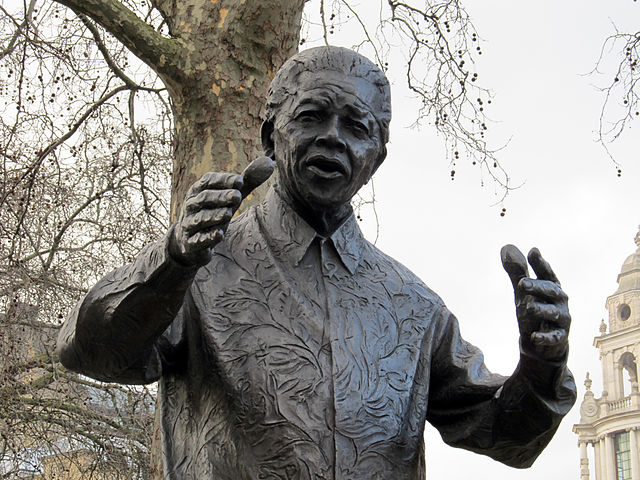When Nelson Mandela decided to step down after only one term as president of his country, he created one of the world’s most exclusive and tiniest clubs.
Almost nowhere do political leaders decide they are so easily dispensable.
In the rich world, most have to be defeated, or see humiliating defeat looming before retiring. In Africa, most leaders have had to be carried out in body bags, their bodies often weighed down with lead.
In this matter, as in so many others, “Madiba” was unique and set a glorious example, which the leaders who now honour him so piously have not the slightest intention of following.
But just being Mandela didn’t always make him right.
It is eminently arguable, for example, that he was wrong not to have taken a second five-year term. For there was crucial work still to be done — particularly when it came to setting the right example for those who would follow.
In office, as through his entire life, his overriding objective was the creation of a democratic, internally peaceful rainbow nation, one that reconciled all races and therefore was spared the apocalyptic race war that some wanted and many believed inevitable.
To this utopian ambition he dedicated his first and only term in office, and he was, of course, overwhelmingly successful.
But in the process, he largely ignored many of the New South Africa’s other great challenges, including AIDS, poverty, inequality and the soul-destroying epidemic of personal corruption that spread among his own comrades.
Such self-enrichment demanded enthusiastic collusion between local elites and foreign corporate interests, a double betrayal that has become the curse of the entire continent.
In Kenya, it’s known charmingly as “our turn to eat.” Whoever wins an election is entitled to make sure his team, and not the public, reaps the benefits.
Who would have guessed at this grotesque betrayal? The great decades-long Canadian grassroots anti-apartheid movement involved tens of thousands of us.
Many of us personally knew many of the exiled ANC “freedom fighters,” as we reverentially called them.
Did a single one of us foresee for one second how many of them would return to their promised land and clamour to have their turn to eat?
Also overlooked
What if Mandela had agreed to a second term where he could have dealt more determinedly with the delivery of the nation (by him and the ruling Africa National Congress) to the tender mercies of international capital, with its inevitable consequences for perpetuating gross inequality?
Or the devastating spread of AIDS, for which, as president, he had little time.
Indeed he did finally begin speaking out courageously on AIDS after he retired. So we can be confident that a second Mandela government would have saved literally hundreds of thousands of men, women and children from painful, preventable deaths.
On the economic front, I fear little would have changed, as inequality predictably grew after 1994 along with the neoliberal policies that dominated the New South Africa as it did much of the poor world.
As to ending the widespread corruption that had quickly eroded the ANC government’s moral leadership, as freedom fighters became multimillionaires richer than Croesus, it’s hard to be confident.
But it’s nicer to believe that Mandela might indeed have come down hard on his comrades who had betrayed the cause by making the government their own personal ATM machine.
History is history. By stepping down, he effectively bequeathed to the nation two singularly unworthy successors: Thabo Mbeki, the twisted AIDS denier, and the ethically-challenged Jacob Zuma, who has come to symbolize the victory of the venal present over the honourable past.
Democratic South Africa’s voyage of development since 1994 has been distinctly erratic, and the same contradictory patterns will likely continue.
Political democracy and free elections are now part of the fabric of life, yet the possibility of ethnic-based parties of the kind that still bedevil so much of Africa is now dangerously real.
Economic progress has been made, but the reality of two distinct nations, based on class, has sharpened.
South Africa remains far and away the economic powerhouse of Africa, but the economy is fragile and half of all young South Africans and a third of all blacks have no work. How do they endure?
The two South Africas
On the one hand, as universally expected, millions of new houses have been built, water and sanitation facilities expanded, new health and education facilities provided.
On the other, tens of millions live as they did in the worst years of apartheid — in squalid shanties with no running water, no sanitation, lousy schools and second-rate health facilities. All of them are black.
Most whites live the same privileged life they lived for decades, as does the new class of rich blacks, a distinct minority unabashedly flaunting their new, easily-won entitlements.
Blacks may not be not terrorized by government thugs as they were in the bad old white days, unless they go on strike at places like the Marikana mine.
Women are proud constitutional and political equals except for the astonishing levels of violence that rages against them.
Like so much of the rest of Africa today, South Africa is characterized by significant progress for some, matched by great inequality and injustice for most.
Which Africa, and which South Africa, will prevail?
Will political power in South Africa remain in the hands of what one union leader impolitely called “a powerful corrupt and demagogic elite of political hyenas”? Or will a new generation emerge to steer the country towards the glass half full?
All of Africa desperately needs a thriving, stable, more equitable South Africa. It remains the continent’s indispensable country.
It will never have another Madiba. Who will? But it has a chance still for the better angels of its nature to prevail.
This article was originally published on the website of the CBC.
Image: wikimedia commons



